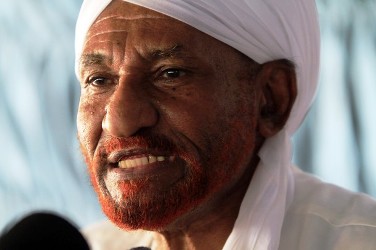Opposition leader distances himself from 100-day scheme to topple regime
June 12, 2013 (KHARTOUM) – The leader of the opposition National Umma Party (NUP), Al-Sadig Al-Mahdi, has distanced himself from a 100-day plan to overthrow the government which was adopted last week by the opposition umbrella National Consensus forces (NCF).

The former prime minister also announced a new initiative to change the regime through collecting a million signatures and organising sit-ins in public squares and other places.
He pointed out that the initiative will be implemented expeditiously to avert any possible war between Khartoum and Juba, with the aim of finding common ground with Sudan Revolutionary Front (SRF) rebels.
Al-Mahdi disclosed that he was approached to participate in the summit meeting which will soon be organised by the presidency, saying that he had been assured that all parties will participate in the meeting and that freedom of discussion will be fully guaranteed.
The NUP leader, who avoided using the phrase “toppling the regime” and instead used “changing the regime”, downplayed the effectiveness of the NCF’s 100-day plan, saying his initiative offered a different solution.
He called upon authorities not to suppress the sit-ins and said that “We will try to avoid clashes with the authorities and the latter must respect the desire of the people”, adding that internal circumstances are conducive for change.
Al-Mahdi also revealed that he made contacts with some international parties about the International Criminal Court’s (ICC) arrest warrant against Sudan’s president, Omer al-Bashir, to arrive at an agreement, saying that the parties showed flexibility towards his call for reconciling between stability and the implications of the arrest warrant.
He directed scathing criticism at the NCF, saying the 100-day plan to topple the regime is in effect an explicit call to suppress it and said that his party was not involved in the preparation and coordination of the plan, stressing that he supports change through peaceful means and not toppling the government within 100 days.
NUP’s representative at the NCF, Abd Al-Galil Al-Basha, passed a note to Al-Mahdi during his remarks, saying that he had participated in all stages of preparation for the 100-day plan.
However, al-Mahdi ignored the note, saying instead that the initiative was aimed at mobilising, not overthrowing the regime.
The NUP leader further called upon the government to reconsider its decision to halt the flow of South Sudan’s oil through Sudanese territory and said that the government’s pretext for stoppage is a “lame excuse” as rebel support continued even after Juba shut down its oil fields last January following a dispute over transit fees.
He also praised remarks by South Sudanese president Salva Kiir calling for calm.
Khartoum has said that its decision to halt the flow of oil was in response to South Sudan’s funding of rebels fighting his government.
Al-Mahdi said that African Union mediator Thabo Mbeki will put forward new proposals to bring closer the views of Sudan and South Sudan notably, the formation of a committee of wise men to take up the complaints of the two sides, saying that Mbeki believes that the main differences between the two countries are the support of the armed opposition and disagreement over border areas.
In a separate issue, the opposition leader said that Sudan would largely benefit from the controversial Ethiopian renaissance dam as it will provide continuous water flow throughout the year, as well as reducing sedimentation in Al-Rusairs dam and producing cheap electricity which could be exported to Sudan.
The remarks by the NUP chief will likely fuel long-standing suspicions by other opposition parties that al-Mahdi is working to frustrate any efforts to move in the direction of regime change.
The decision by al-Mahdi’s son, Abdel-Rahman, to take up the post of presidential assistant was widely seen as a step by al-Mahdi to appease the ruling NCP.
Some within the NUP politburo privately say that they believe al-Mahdi has forged a secret deal with the NCP in which he agreed to block any efforts in the direction of regime change.
(ST)
